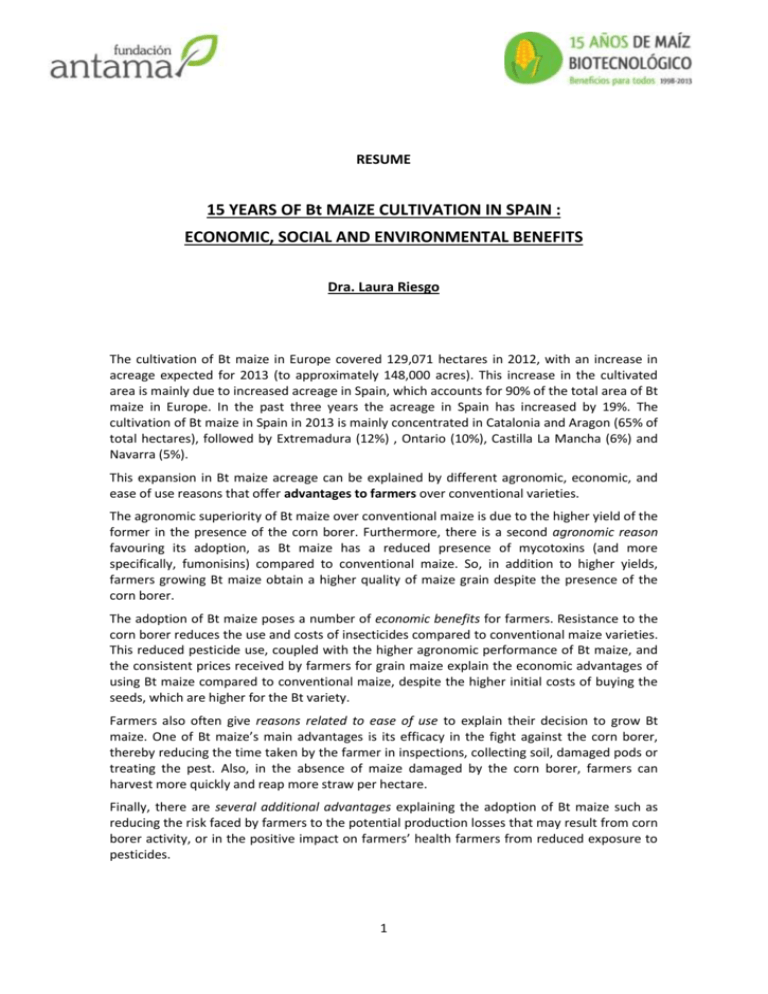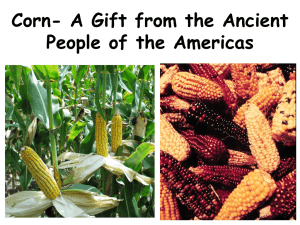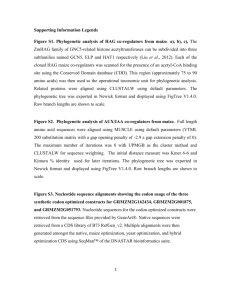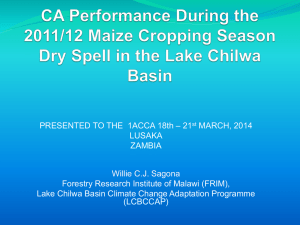15 YEARS OF Bt MAIZE CULTIVATION IN SPAIN
advertisement

RESUME 15 YEARS OF Bt MAIZE CULTIVATION IN SPAIN : ECONOMIC, SOCIAL AND ENVIRONMENTAL BENEFITS Dra. Laura Riesgo The cultivation of Bt maize in Europe covered 129,071 hectares in 2012, with an increase in acreage expected for 2013 (to approximately 148,000 acres). This increase in the cultivated area is mainly due to increased acreage in Spain, which accounts for 90% of the total area of Bt maize in Europe. In the past three years the acreage in Spain has increased by 19%. The cultivation of Bt maize in Spain in 2013 is mainly concentrated in Catalonia and Aragon (65% of total hectares), followed by Extremadura (12%) , Ontario (10%), Castilla La Mancha (6%) and Navarra (5%). This expansion in Bt maize acreage can be explained by different agronomic, economic, and ease of use reasons that offer advantages to farmers over conventional varieties. The agronomic superiority of Bt maize over conventional maize is due to the higher yield of the former in the presence of the corn borer. Furthermore, there is a second agronomic reason favouring its adoption, as Bt maize has a reduced presence of mycotoxins (and more specifically, fumonisins) compared to conventional maize. So, in addition to higher yields, farmers growing Bt maize obtain a higher quality of maize grain despite the presence of the corn borer. The adoption of Bt maize poses a number of economic benefits for farmers. Resistance to the corn borer reduces the use and costs of insecticides compared to conventional maize varieties. This reduced pesticide use, coupled with the higher agronomic performance of Bt maize, and the consistent prices received by farmers for grain maize explain the economic advantages of using Bt maize compared to conventional maize, despite the higher initial costs of buying the seeds, which are higher for the Bt variety. Farmers also often give reasons related to ease of use to explain their decision to grow Bt maize. One of Bt maize’s main advantages is its efficacy in the fight against the corn borer, thereby reducing the time taken by the farmer in inspections, collecting soil, damaged pods or treating the pest. Also, in the absence of maize damaged by the corn borer, farmers can harvest more quickly and reap more straw per hectare. Finally, there are several additional advantages explaining the adoption of Bt maize such as reducing the risk faced by farmers to the potential production losses that may result from corn borer activity, or in the positive impact on farmers’ health farmers from reduced exposure to pesticides. 1 The adoption of Bt maize, besides generating advantages for farmers, has also brought benefits to Spanish foreign trade. The Spanish economy has traditionally been characterized by its inability to meet domestic demand for maize grain production, which is why it has needed to import maize. This dependence on foreign production has caused the volume of imports to increase by 56% between 2010 and 2012, and the value of imports has increased by 93% as a result of rising grain prices, Bt maize has mitigated the Spanish economy’s dependence on imported maize, which has been lower than it would have been if farmers had not adopted the crop. This paper estimates that the volume of maize imports averted by the adoption of Bt corn between 1998 and 2013 now amount to more than 853,000 tonnes, reaching a current averted cost of approximately 156 million euros. The adoption of Bt corn has also generated a number of environmental benefits in Spain related to pesticide use, water use and CO2 fixation. As noted above, the fewer insecticide treatments against the corn borer required by Bt maize relative to the conventional variety has allowed for selective control of pests, thereby generating a number of benefits to non-target organisms present in the maize fields. In terms of water use, the volume generated by Bt maize from 1998-2013 (853,201 tonnes) would have been greater if it had been conventional corn, with a consequent loss of crop diversity on farms or increasing pressure on uncultivated land. Moreover, the additional maize would have generated an additional demand for water of 490.126 thousand m3. This is equivalent to the water used by 59 cities of over 10,000 inhabitants. Also, in a global context, the adoption of Bt maize in Spain has averted a water footprint of 1,041 million m3 during the 16 years of production, thus reducing the pressure of human activities on fresh water. Finally it should be noted that Bt maize in Spain has generated a net additional carbon fixation of 662.937 ton CO2 equivalent. The aggregate net carbon fixation arising from the use of Bt maize for 16 years to the present will have offset annual CO2 emissions in Spain by the equivalent of 22,394 cars. 2








